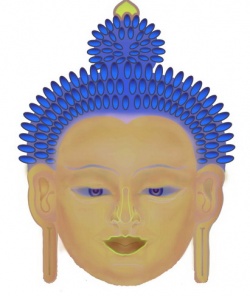Difference between revisions of "Buddhas' Names Sutra"
(Created page with "thumb|250px| <poem> Buddhas' Names Sutra 仏名経 (Chin Fo-ming-ching; Jpn Butsumyo ᆳkyo ) A work translated into {{Wiki|Chine...") |
|||
| Line 4: | Line 4: | ||
[[仏名経]] (Chin [[Fo-ming-ching]]; Jpn [[Butsumyo ᆳkyo]] ) | [[仏名経]] (Chin [[Fo-ming-ching]]; Jpn [[Butsumyo ᆳkyo]] ) | ||
| − | A work translated into {{Wiki|Chinese}} around 520 by [[Bodhiruchi]], founder of the [[Treatise on the Ten Stages Sutra]] ([[ | + | A work translated into {{Wiki|Chinese}} around 520 by [[Bodhiruchi]], founder of the [[Treatise on the Ten Stages Sutra]] (Chin [[Ti-lun]]) school. This [[sutra]] lists the names of 11,093 [[Buddhas]] and [[bodhisattvas]] and describes their [[blessings]]. There are several [[sutras]] of this kind, such as the [[Names of Three Thousand Buddhas Sutra]]. They were used in a {{Wiki|ceremony}} that gained popularity in [[China]] around the fifth or sixth century, in which the names of the [[Buddhas]] of past, present, and future were recited to expiate past offenses. In [[Japan]], it is [[thought]] that the earliest such {{Wiki|ceremony}} was held in 774. In the early ninth century, this {{Wiki|ceremony}} came to be observed in the {{Wiki|imperial}} palace and in provincial [[temples]] over a period of three days, beginning on the fifteenth day (later, the nineteenth day) of the twelfth month. Later the period was shortened to one night. |
</poem> | </poem> | ||
{{R}} | {{R}} | ||
[http://www.sgilibrary.org/search_dict.php?id=232 www.sgilibrary.org] | [http://www.sgilibrary.org/search_dict.php?id=232 www.sgilibrary.org] | ||
[[Category:Japanese terminology]] | [[Category:Japanese terminology]] | ||
Revision as of 05:41, 8 November 2013
Buddhas' Names Sutra
仏名経 (Chin Fo-ming-ching; Jpn Butsumyo ᆳkyo )
A work translated into Chinese around 520 by Bodhiruchi, founder of the Treatise on the Ten Stages Sutra (Chin Ti-lun) school. This sutra lists the names of 11,093 Buddhas and bodhisattvas and describes their blessings. There are several sutras of this kind, such as the Names of Three Thousand Buddhas Sutra. They were used in a ceremony that gained popularity in China around the fifth or sixth century, in which the names of the Buddhas of past, present, and future were recited to expiate past offenses. In Japan, it is thought that the earliest such ceremony was held in 774. In the early ninth century, this ceremony came to be observed in the imperial palace and in provincial temples over a period of three days, beginning on the fifteenth day (later, the nineteenth day) of the twelfth month. Later the period was shortened to one night.
